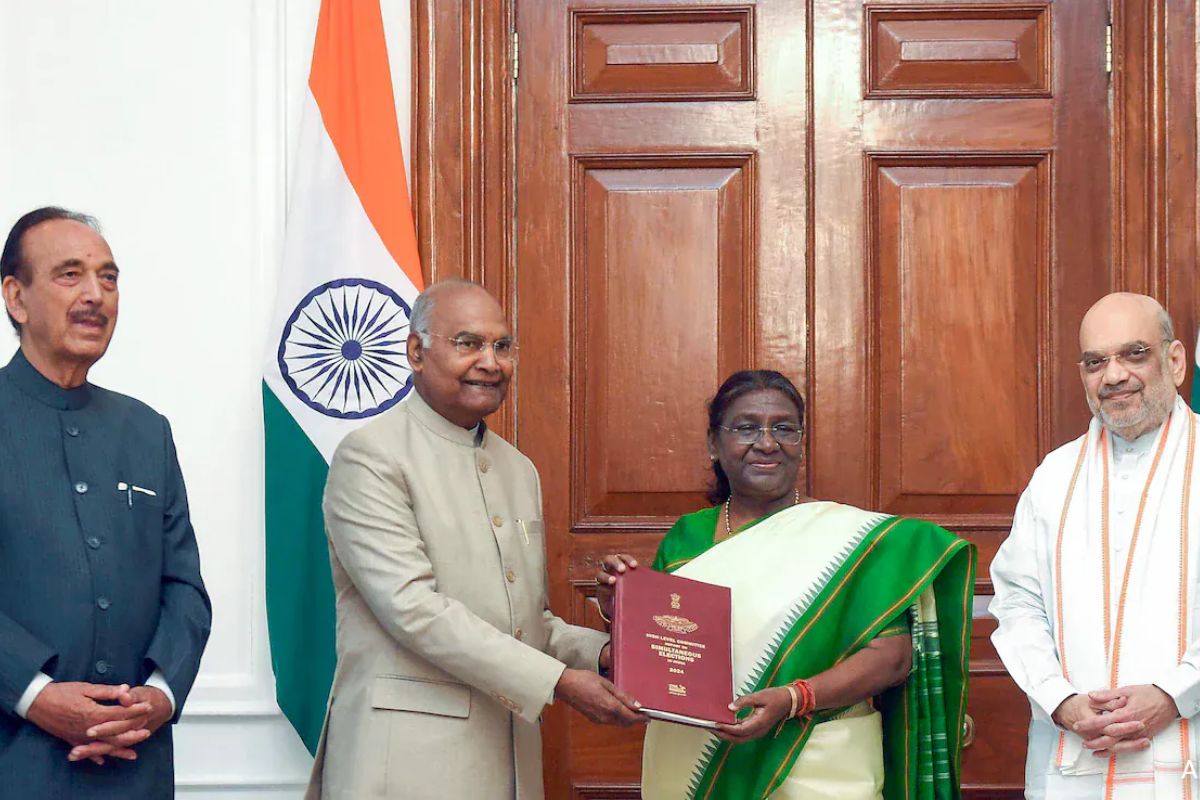


A big thing just happened! There’s this committee called ‘One Nation One Poll’, and it’s led by former President Ram Nath Kovind. They just gave their big report to President Droupadi Murmu. This report is super important because it says we need to have all our elections happen at the same time. They think if we do that, it will help our economy and stop things from getting all messed up every time we have elections. So basically, they’re saying that having elections all together would be good for our country.
Table of Contents
ToggleThe big idea behind this game-changing plan started taking shape on September 2, 2023, when a special group called the High-Level Committee on Simultaneous Elections was put together. From that day on, the committee has been working hard for 191 days. They’ve been talking to lots of different people, like experts and groups involved in elections, and doing a ton of research. Now, after all that effort, they’ve come up with a super detailed report that’s a whopping 18,626 pages long. This report shows how deeply they looked into everything and how much they thought about it.
The presentation of the report took place at Rashtrapati Bhavan. It was attended by several notable figures, such as Amit Shah, who serves as the Union Home Minister, Arjun Ram Meghwal, the Union Law Minister, and Gulam Nabi Azad, who leads the Democratic Progressive Azad Party (DPAP), among others. This indicates that the committee aimed to gather diverse perspectives and viewpoints in shaping decisions regarding India’s elections. They intend to ensure that everyone’s opinions are considered, allowing for fair and inclusive decisions that will shape the future of India’s electoral processes.
Additionally, the committee has made efforts to gather opinions from a wide range of political parties, regardless of their different beliefs and ideas. Representatives from well-known parties like BJP, Trinamool Congress, Samajwadi Party, CPI, CPI(M), AIMIM, RPI, and Apna Dal have shared their thoughts, which has made the discussions more informative. This teamwork shows how everyone is dedicated to building a strong and fair democratic system that includes everyone.
Understanding how important it is for everyone to have a say in making important decisions, the committee asked the public to share their thoughts on the idea of having ‘One Nation, One Election.’ They put out a notice to let everyone know they could give suggestions on how to make this idea work better within the laws and rules we already have. This way, it would be easier to have elections happening all over the country at the same time. This way of involving everyone shows how much they believe in democracy and making sure people have a say in what happens.
Making our voting system the same across the country is not easy. There are lots of different things to think about and plan for. A group has come up with some ideas to help make this happen. They suggest a bunch of changes, like making sure everyone’s names are on the voting lists correctly and changing some rules in our laws and constitution. One big thing they talk about is how to smoothly switch over to this new system for both national and state elections. They know it’s a big job with lots of little details, but they’ve made a detailed plan to help make it happen. This plan is like a roadmap showing the way to make big changes.
In conclusion, the ‘One Nation One Election’ report marks a crucial step forward in India’s democratic progress. This report suggests holding all elections across the country at the same time. It shows how dedicated the committee is to strengthening democracy, helping the economy, and bringing people closer together. As India moves ahead with this big change, it’s vital for everyone involved to come together, put aside political differences, and work towards a common goal of making our nation better for everyone.
This picture shows the step-by-step path to achieve a One Nation One Poll, which means all elections happening at the same time across the country. It explains the important stages in the process of making this big change in how we vote.
A. One Nation One Poll proposes to synchronize all elections in India to occur simultaneously, aiming to streamline the electoral process and minimize disruptions caused by frequent elections. This initiative is believed to have potential economic benefits and enhance governance efficiency by reducing the time and resources spent on election preparations.
A. The decision-making process involves various stakeholders, including government bodies, political parties, election commissions, and citizens. The High-Level Committee on Simultaneous Elections, led by former President Ram Nath Kovind, has played a significant role in studying the feasibility and implications of this proposal. Additionally, consultations with experts, political leaders, and the public have been conducted to gather diverse perspectives.
A. Several challenges must be addressed, including logistical concerns, legal amendments, and ensuring inclusivity in decision-making. Logistical challenges involve updating electoral rolls, enhancing security measures, and allocating resources for conducting multiple elections simultaneously. Legal amendments may be required to modify existing laws and the constitution to accommodate the new electoral system. Furthermore, fostering inclusive stakeholder engagement and addressing concerns from various political parties and citizens are crucial for building consensus and ensuring the legitimacy of the electoral reforms.

